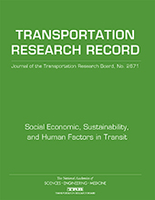
TRANSPORTATION RESEARCH RECORD
Scope & Guideline
Shaping Policy Through Cutting-Edge Research
Introduction
Aims and Scopes
- Transportation Safety and Risk Assessment:
Research in this area encompasses studies aimed at evaluating and improving safety measures across various transportation modes, including the analysis of crash data, risk factors, and the effectiveness of safety interventions. - Innovations in Transportation Technology:
This includes the exploration of emerging technologies such as connected and automated vehicles, smart traffic management systems, and the application of artificial intelligence and machine learning in transportation. - Environmental Impacts and Sustainability:
Papers focus on evaluating and minimizing the environmental footprint of transportation systems, assessing the impacts of policies aimed at reducing emissions, and promoting the adoption of sustainable practices. - Infrastructure Development and Maintenance:
Research covers the assessment, design, and management of transportation infrastructure, including pavements, bridges, and intermodal facilities, with an emphasis on innovative materials and construction techniques. - Travel Behavior and Urban Mobility:
Studies investigate factors influencing travel behavior, mode choice, and the integration of various transportation modes, particularly in urban contexts, to promote efficient and equitable mobility solutions. - Policy and Economic Analysis:
This scope includes the evaluation of transportation policies, economic impacts of transportation investments, and the role of public-private partnerships in enhancing transportation systems.
Trending and Emerging
- Connected and Automated Vehicles (CAVs):
Research on CAVs is rapidly growing, focusing on their implications for traffic safety, infrastructure requirements, and integration into existing transportation systems. - Data-Driven Decision Making:
The use of big data, machine learning, and artificial intelligence to inform transportation planning and operations is a prominent trend, enhancing predictive capabilities and operational efficiencies. - Sustainability and Climate Resilience:
There is an increased emphasis on sustainability, with research exploring the environmental impacts of transportation systems and strategies to enhance climate resilience. - Equity in Transportation:
Emerging studies highlight the importance of equity in transportation access and decision-making, focusing on underserved populations and the impacts of transportation policies. - Health and Mobility Interactions:
Research is increasingly examining the connections between transportation systems and public health, including the effects of urban design on physical activity and well-being.
Declining or Waning
- Traditional Traffic Engineering Methods:
There has been a noticeable decline in publications focused on conventional traffic engineering practices, as the field increasingly embraces data-driven approaches and advanced technologies. - Focus on Individual Modes of Transportation:
Research concentrating solely on single modes of transport (e.g., only cars or buses) is becoming less prevalent, with a growing emphasis on multimodal and integrated transportation solutions. - Static Infrastructure Design:
Static approaches to infrastructure design are being overshadowed by dynamic, adaptive models that incorporate real-time data and changing traffic conditions. - Regional Studies of Transportation Behavior:
While regional studies were once a significant focus, there is a shift toward more global or larger-scale analyses that consider broader trends and patterns affecting multiple regions.
Similar Journals
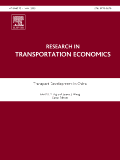
Research in Transportation Economics
Advancing Knowledge at the Intersection of Transport and EconomicsResearch in Transportation Economics, published by Elsevier Science Ltd, is a leading academic journal dedicated to the advancement of knowledge in the fields of transportation economics and policy. With an ISSN of 0739-8859 and an E-ISSN of 1875-7979, this journal serves as a critical platform for researchers, scholars, and practitioners to contribute groundbreaking studies and analyses that influence both theoretical frameworks and practical applications. Recognized with a Q1 rank in the category of Economics, Econometrics, and Finance (miscellaneous) and a Q2 rank in Transportation for 2023, the journal stands out in its commitment to rigorous research, presenting insights that enhance our understanding of economic dynamics within the transportation sector. With a robust Scopus ranking positioned at #9 out of 242 in its primary category, achieving a remarkable 96th percentile rating, Research in Transportation Economics is integral for those looking to explore the intersection of economics and transport systems. The journal welcomes contributions on various themes ranging from transport policy analyses to the evaluation of economic impacts on transportation systems, thus playing a vital role in shaping future policies and practices in the industry. As the field continues to evolve, the journal's annual publications from 2004 to 2024 will provide ongoing opportunities for scholarly exchanges and innovations.
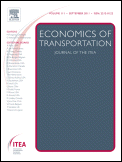
Economics of Transportation
Navigating the complexities of transport systems.Economics of Transportation is a premier academic journal published by ELSEVIER, dedicated to advancing the field of transportation economics. Since its inception in 2012, this journal has carved a niche for itself, ranking in the Q1 category for both Economics, Econometrics and Finance, as well as Transportation in the 2023 rankings. With an impressive Scopus Rank of 34 out of 242 in its primary category, and a percentile of 86, it serves as a crucial platform for disseminating high-quality research that influences policy and practice in transportation systems worldwide. Though it operates on a subscription basis, the journal's commitment to integrating theoretical insights with practical applications makes it an indispensable resource for researchers, professionals, and students dedicated to understanding and improving transportation economics. Its comprehensive scope includes topics ranging from market analysis and transport infrastructure economics to sustainability and technology, thus ensuring its relevance to contemporary issues faced in the field.
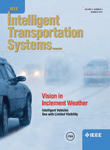
IEEE Intelligent Transportation Systems Magazine
Elevating Standards in Intelligent Transport SolutionsIEEE Intelligent Transportation Systems Magazine, published by the IEEE-Institute of Electrical and Electronics Engineers Inc., is a leading journal in the fields of automotive engineering, computer science applications, and mechanical engineering. With an impressive impact factor reflected in its 2023 rankings, this journal sits in the top quartile (Q1) across multiple engineering categories, making it an essential resource for researchers and professionals dedicated to advancing the intelligent transportation systems landscape. The magazine covers a diverse array of topics from vehicle technology innovations to traffic management solutions, aimed at improving transportation efficiency, safety, and sustainability. Since its inception in 2009, the publication has established a solid reputation for disseminating cutting-edge research and practical applications in intelligent transportation, all while remaining an accessible resource for academic and industrial stakeholders alike. Subscribe today to stay at the forefront of transformative transportation technologies!
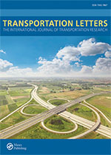
Transportation Letters-The International Journal of Transportation Research
Connecting ideas and solutions in the world of transportation.Transportation Letters - The International Journal of Transportation Research, published by Taylor & Francis Ltd, is a leading journal dedicated to advancing the field of transportation studies. With an impact factor that reflects its significance within the academic community and a prestigious ranking of Q2 in Transportation, this journal provides a critical forum for the dissemination of innovative research and insights in transportation systems, policies, and technologies. Covering a broad scope of topics from urban mobility to logistics and infrastructure, Transportation Letters serves as an essential resource for researchers, professionals, and students aiming to deepen their understanding of transportation issues facing society today. With over a decade of publication since 2009, the journal has established a solid reputation, ranking 46th out of 141 in Scopus's transportation category, placing it in the 67th percentile. Although it does not operate under an open-access model, it remains committed to accessibility through various subscription options, ensuring that vital research is available to those shaping the future of transportation.
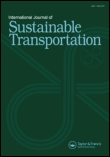
International Journal of Sustainable Transportation
Exploring Pathways to Sustainable TransportationInternational Journal of Sustainable Transportation, published by Taylor & Francis Inc, stands at the forefront of research in sustainable mobility, addressing critical challenges within the fields of engineering, environmental science, and urban planning. With ISSN 1556-8318 and E-ISSN 1556-8334, this journal is recognized for its exceptional quality, evidenced by its Q1 rankings across multiple categories including Automotive Engineering, Civil and Structural Engineering, Environmental Engineering, and Transportation, as well as a notable presence in Renewable Energy and Sustainability. Its impact is further amplified by impressive Scopus rankings, securing top positions in various fields, ensuring that it serves as a pivotal resource for researchers, practitioners, and policymakers dedicated to advancing sustainable transportation solutions. The journal actively disseminates cutting-edge research that informs sustainable practices worldwide, thus contributing to the development of greener transportation methods. As it continues its mission from 2007 to 2024, International Journal of Sustainable Transportation remains essential for anyone looking to explore innovative approaches to the transportation challenges of our time.
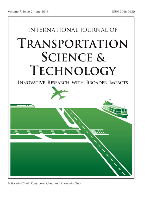
International Journal of Transportation Science and Technology
Pioneering insights for the future of mobility and infrastructure.The International Journal of Transportation Science and Technology, published by KEAI PUBLISHING LTD, stands as a pivotal resource in the fields of transportation, automotive engineering, civil and structural engineering, and policy management. With a robust Open Access model since its inception in 2012, this journal provides unparalleled visibility to research that impacts real-world transportation systems and infrastructure. The journal proudly holds a Q1 category ranking in crucial engineering fields, reflecting its high impact and quality of published research. Its diverse scope and comprehensive coverage make it an essential platform for researchers, professionals, and students alike who are eager to contribute to the advancement of transportation science and technology. With impressive Scopus rankings underscoring its relevance in environmental science and social sciences related to transport, the International Journal of Transportation Science and Technology continues to foster innovation and influence policy development globally, addressing the challenges of modern transportation systems.

TRANSPORTATION
Advancing Knowledge in Transportation StudiesTRANSPORTATION is a premier academic journal published by Springer, focusing on the dynamic and interdisciplinary field of transportation studies. Established in 1972 and set to release its latest findings through 2024, the journal has garnered a strong reputation, reflected in its impressive impact factor and Q1 quartile rankings across key categories including Civil and Structural Engineering, Development, and Transportation. With a robust Scopus ranking that places it in the top percentile of its fields (ranked #16/306 in Social Sciences - Development, #27/379 in Engineering - Civil and Structural Engineering, and #23/141 in Social Sciences - Transportation), "TRANSPORTATION" is crucial for researchers, professionals, and students alike who seek to expand their understanding of innovative transport systems, policies, and technologies. By offering in-depth research articles, reviews, and case studies, the journal serves as a vital resource for advancing academic knowledge and practical solutions in the transportation sector. Part of a thriving academic community, contributors and readers alike are encouraged to engage with the latest research to foster development in pressing issues related to mobility and infrastructure.
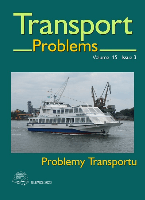
Transport Problems
Exploring Innovative Solutions in Transport EngineeringTransport Problems, published by the Silesian University of Technology, Faculty of Transport, is a distinguished open-access journal that has been advancing scholarship in the fields of Automotive Engineering, Mechanical Engineering, and Transportation since its inception in 2007. With an ISSN of 1896-0596 and an E-ISSN of 2300-861X, this journal serves as a vital platform for researchers and practitioners to disseminate innovative research findings and explore fundamental issues in transport systems and technologies. Based in Poland, the journal covers various topics including transportation logistics, vehicle dynamics, and environmental impacts, thereby addressing critical challenges faced in the transportation sector globally. As reflected in its Scopus rankings, the journal occupies respectable quartiles and continues to contribute valuable insights to the academic community. By making its content freely accessible, Transport Problems significantly enhances the ability of researchers and students alike to engage with the latest developments in transport engineering and contribute to this ever-evolving field.

TRANSPORTATION RESEARCH PART C-EMERGING TECHNOLOGIES
Driving Excellence in Transportation ResearchTRANSPORTATION RESEARCH PART C - EMERGING TECHNOLOGIES is a leading journal dedicated to the exploration and dissemination of innovative solutions in the field of transportation. Published by PERGAMON-ELSEVIER SCIENCE LTD in the United Kingdom, this journal has been pivotal in advancing the understanding of emerging transportation technologies since its inception in 1993. With a robust impact across multiple disciplines, it proudly holds a Q1 status in key categories such as Automotive Engineering, Civil and Structural Engineering, and Computer Science Applications, underscoring its vital role in shaping research and development in these areas. Researchers and practitioners are encouraged to engage with its rich repository of knowledge, which includes rigorous peer-reviewed articles aimed at addressing contemporary challenges in the transportation sector. While it currently does not operate under an Open Access model, the journal remains an essential resource for professionals and scholars committed to the field. With an affiliation to the prestigious Scopus database, TRANSPORTATION RESEARCH PART C stands as a beacon of scholarly excellence, driving the future of transportation technologies.
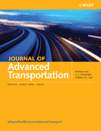
JOURNAL OF ADVANCED TRANSPORTATION
Advancing the Future of Transportation ResearchJOURNAL OF ADVANCED TRANSPORTATION, published by WILEY-HINDAWI, stands as a pivotal platform in the fields of automotive engineering, computer science applications, economics, mechanical engineering, and strategy and management. With an impressive impact factor and positioned in the Q2 quartile across multiple categories as of 2023, this open-access journal offers researchers, professionals, and students unparalleled opportunities to disseminate and access cutting-edge research. Operating under an open access model since 2017, the journal fosters global collaboration and knowledge exchange, encouraging innovative solutions to contemporary transportation challenges. Its comprehensive scope, spanning converged years from 1979 to 2024, reflects its commitment to addressing the evolving landscape of transport systems worldwide. Researchers from diverse disciplines are invited to contribute transformative studies that advance the field and inspire future endeavors.